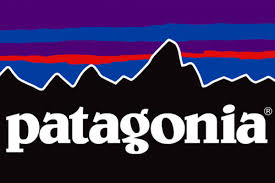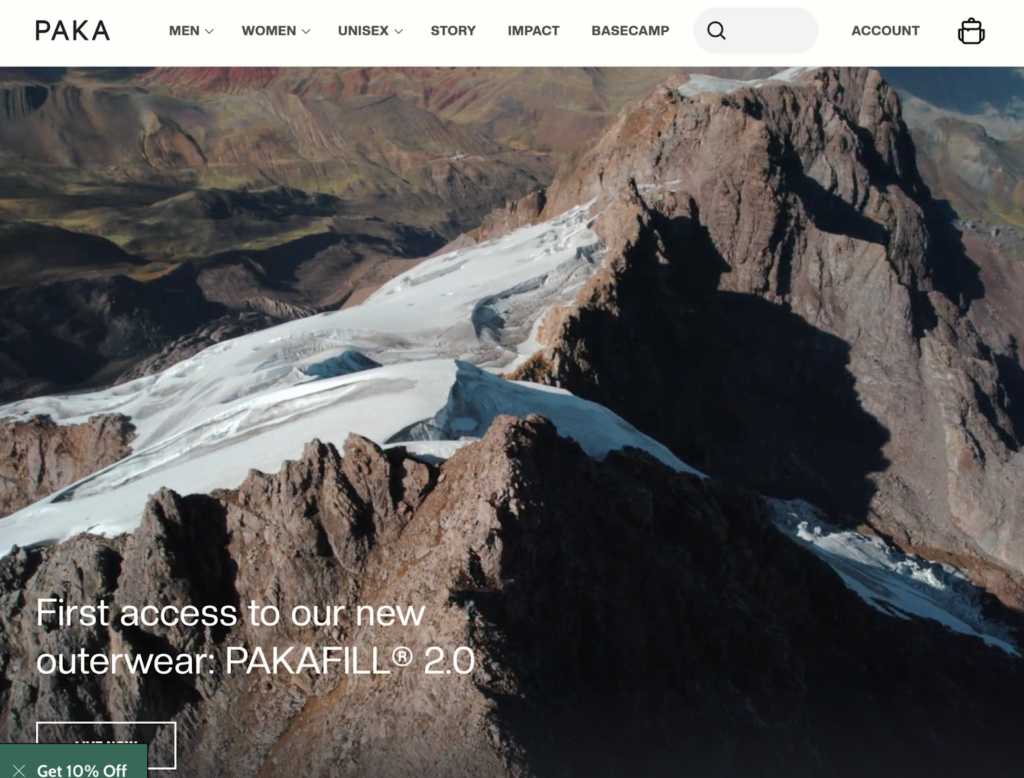9 Most Sustainable Winter Clothing Brands: The Conscious Consumer’s Guide
Affiliate Disclosure
Hey fellow impactful ninja ?
You may have noticed that Impactful Ninja is all about providing helpful information to make a positive impact on the world and society. And that we love to link back to where we found all the information for each of our posts.
Most of these links are informational-based for you to check out their primary sources with one click.
But some of these links are so-called "affiliate links" to products that we recommend.
Why do we add these product links?
First and foremost, because we believe that they add value to you. For example, when we wrote a post about the environmental impact of long showers, we came across an EPA recommendation to use WaterSense showerheads. So we linked to where you can find them. Or, for many of our posts, we also link to our favorite books on that topic so that you can get a much more holistic overview than one single blog post could provide.
And when there is an affiliate program for these products, we sign up for it. For example, as Amazon Associates, we earn from qualifying purchases.
What do these affiliate links mean for you?
First, and most importantly, we still only recommend products that we believe add value for you.
When you buy something through one of our affiliate links, we may earn a small commission - but at no additional costs to you.
And when you buy something through a link that is not an affiliate link, we won’t receive any commission but we’ll still be happy to have helped you.
What do these affiliate links mean for us?
When we find products that we believe add value to you and the seller has an affiliate program, we sign up for it.
When you buy something through one of our affiliate links, we may earn a small commission (at no extra costs to you).
And at this point in time, all money is reinvested in sharing the most helpful content with you. This includes all operating costs for running this site and the content creation itself.
What does this mean for me personally?
You may have noticed by the way Impactful Ninja is operated that money is not the driving factor behind it. It is a passion project of mine and I love to share helpful information with you to make a positive impact on the world and society. However, it's a project in that I invest a lot of time and also quite some money.
Eventually, my dream is to one day turn this passion project into my full-time job and provide even more helpful information. But that's still a long time to go.
Stay impactful,
Amid growing concerns about the textile industry’s environmental impact, there is pressure to find greener clothes for your wardrobe, from the most inner to the most outer layer clothing items. Unfortunately, fashion greenwashing makes it harder for you and all other consumers to figure out which clothing brands offer the most eco-friendly garments. So, we had to ask: Which are the most sustainable winter clothing brands?
The most sustainable winter clothing brands are Patagonia, BEDI, and Paka, which prioritize low-impact recycled materials, reduce carbon emissions, and give back to fight the climate crisis. In addition, Askov Finlayson and Wuxly minimize textile waste and compensate for their climate impact.
Whether you are searching for a functional jacket for winter adventuring or some everyday urban outerwear without negatively impacting the soil, the water, the animals, and other people, there is a brand for you. So, let’s keep reading to learn more about the most sustainable winter clothing brands and how they ensure sustainable, ethical practices.
Here’s How We Selected the Most Sustainable Winter Clothing Brands
The fast fashion industry has pushed for winter clothing items to be trend-dependent and easily replaceable. Yet, the environmental impacts of making and landfilling clothes can be enormous, especially with certain materials.
“Sustainable: The ability to be maintained at a certain rate or level | Avoidance of the depletion of natural resources in order to maintain an ecological balance”
Oxford Dictionary
The brands on this list were chosen based on their commitment and actions to promote sustainable practices while reducing the environmental impacts of the textile industry.
They are transparent about their materials, processes, and workforce management within their supply chain.
Some brands focus their efforts on reducing waste and optimizing natural resources while others strive to reduce the carbon footprint of their clothes.
All of these brands share the commitment to reshape the textile industry toward a more sustainable and Earth-friendly sector.
These Are the 9 Most Sustainable Winter Clothing Brands
Most Sustainable Winter Clothing Brands
Overall, these winter clothing brands are sustainable. Yet, they take various approaches to reduce environmental impacts and uphold ethical standards. Let’s dive into each brand and find out more.
Patagonia: Everyday Wear for Those Who Care


“Together, we can prioritize purpose over profit and protect this wondrous planet, our only home.”
Patagonia
🌎
How do they ensure their sustainability?
Patagonia puts sustainability at the center of their operation. They work to reduce, rather than simply offset, carbon emissions where it matters the most: in the supply chain and material manufacturing. They reduce their carbon footprint by removing high-impact virgin fossil-based fibers from their collections, using “Environmental Profit and Loss” to guide their production decision, and helping their suppliers to cut emissions. For example, Patagonia’s fall 2023 collection was made up mostly of preferred materials (91% by fabric weight), including Regenerative Organic Certified fibers, hemp, man-made cellulose fibers, recycled cotton, and recycled polyester. On top of that, Patagonia’s Worn Wear Program encourages customers to repair and recycle their products, extending the textile lifecycle and reducing waste. Lastly, Patagonia is certified as a B Corporation and a Bluesign® brand.
🌐
How do they ensure their ethics?
Patagonia commits to fair trade practices. Through the partnership with Fair Trade USA, they currently produce 86% of their clothes in 20 Fair Trade Certified™ factories. Patagonia pays a premium for every item produced in such factories, accumulating in a fund for workers to use in their chosen community projects, whether in healthcare or parent support or to withdraw as a cash bonus. Additionally, they have various social responsibility programs to prevent harm and create positive impacts on the lives of apparel workers in their supply chain. These include the Fair Labor Association, the Living Wage Program, the Migrant Workers Program, and the Responsible Purchasing Practices. Patagonia is also fully transparent about the locations of their facilities and suppliers.
🤝
Are they part of any giving-back programs?
Since 1985, Patagonia has pledged 1% of sales annually to environmental causes. They have awarded over $89 million in cash and kind donations to domestic and international grassroots environmental groups, making a difference in their local communities. In 2022, the founder of Patagonia gave away his family’s ownership of the company to the newly created Patagonia Purpose Trust and the not-for-profit organization Holdfast Collective, ensuring that all future profits from the company are used to fight the climate and extinction crisis.
🛍️
What is their product range?
- Best for: kidswear, menswear, womenswear
- Product range: shirts, pants, jackets, blazers, hoodies, sweatshirts, T-shirts, shorts, plus-size
- Price range: $$$
- Size range: XXS–XXXL
BEDI: Winter Outerwear From Recycled Materials

“Exceptionally sustainable materials and Canadian craftsmanship have resulted in a collection of utilitarian designs with impeccable detailing.”
BEDI
🌎
How do they ensure their sustainability?
BEDI ensures their sustainability by sourcing low-impact materials, minimizing waste, and reducing carbon emissions. Firstly, BEDI uses a high proportion of recycled and upcycled materials repurposed from various waste streams. These include ECONYL®, a 100% regenerated nylon fiber made from discarded fishing nets, premium leather salvaged from the furniture and aviation industries in Italy, car seat belts from scrap yards, deadstock weather-resistant twill taken from leftover outdoor furniture fabric, and recycled metal. Specifically, their OEKO-TEX®-certified ECONYL® materials, used in all their outerwear and approximately 48% of their bags, are highly water resistant, reducing the likelihood of microfiber releases. Additionally, BEDI opts for low-impact materials when it comes to virgin fabrics. Specifically, they use sustainably grown cotton, RWS-certified merino wool, and vegan leather made from cactus (Desserto®). Secondly, the brand takes many approaches beyond salvaging and upcycling existing materials to minimize waste. They employ technology to determine the optimal layouts to keep excess fabric as small as possible. In particular, small fabric scraps from cutting are used to make bag sections and keychains. Furthermore, they make everything in small batches, enabling real-time adjustments to minimize waste. And their efforts to reduce waste don’t stop when their products leave the store. In fact, BEDI offers a lifetime guarantee on all outerwear and bags with which they fix broken items for free, keeping them in circulation longer. Their “Second Life” program enables customers to return any BEDI products to be refurbished and resold. Lastly, BEDI keeps their carbon emissions low via manufacturing locally in Montreal, where 99% of electricity comes from renewable sources, making products by hand, transporting materials by boats, and shipping out orders with carbon-neutral shipping partners.
🌐
How do they ensure their ethics?
BEDI traces most of their suppliers and holds the final production stage in Canada, a low-risk country for labor abuse. They state that all BEDI employees and contractors are paid a living wage. They also share the makers of their products on their website.
🤝
Are they part of any giving-back programs?
BEDI is not known to be part of any giving-back programs.
🛍️
What is their product range?
- Best for: womenswear, menswear
- Product range: outerwear, knitwear, accessories
- Price range: $$$
- Size range: XS–3XL
Paka: Cold-Weather Garments Made With Traceable Alpaca Wool


“Paka was created to bring you closer to where your clothing comes from, what it’s made of, and who made it.”
Paka
🌎
How do they ensure their sustainability?
Paka prioritizes sustainability by innovating and making low-impact, high-performing fabrics with ethical alpaca wool. In particular, they source alpaca wool from small-scale, family-owned herds. Each herd contains 60 to 90 animals roaming free throughout the Peruvian Andean Highlands. After the fleece is shorn, the fiber is collected and separated by hand before being colored (if needed) with environmentally friendly dyes certified by OEKO-TEX® and GOTS. Half of the energy used in their alpaca wool spinning process comes from solar energy. Further down the life-cycle in the transporting stage, Paka alpaca products are delivered carbon-neutral through their partnership with Ecocart. The packaging is also fully biodegradable.
🌐
How do they ensure their ethics?
Paka ensures their ethics by making their alpaca wool products fully traceable, from free-roaming alpacas up in the Andes Mountains to customers’ homes in the US. The 100+ Quechua women weavers who make Paka’s products are employed by the brand and paid 4 times the family living wage. Regarding alpaca treatment, Paka uses a special technique (Inca Esquila) to minimize the time and stress posed upon the animal during the shearing process.
🤝
Are they part of any giving-back programs?
Through their partnership with Peruvian Hearts, Paka supports the education of underprivileged Peruvian young women with 1% of their annual revenues. Another 1% of their sales supports regenerative agriculture and alpaca families. Additionally, they provide free weaving training for women who want to learn a skill, as well as a “Wawa Wasi” (daycare) in the neighborhood, with full-time supervision and a trained psychologist to enable mothers to go to work. Lastly, Paka is helping to build an NGO that preserves the Inca traditions.
🛍️
What is their product range?
- Best for: women’s and men’s knitwear
- Product range: jackets, sweaters, hoodies, baselayer, T-shirts, joggers, socks, underwear, accessories
- Price range: $$$
- Size range: XXS–XXL
Askov Finlayson: Climate-Positive Winter Jackets


“We hold ourselves accountable for our carbon footprint each and every year and Give 110% to support leading-edge solutions to the climate crisis.”
Askov Finlayson
🌎
How do they ensure their sustainability?
Askov Finlayson ensures their sustainability by adopting a carbon-positive business model that enables the growth of their positive impact to outpace the growth of their carbon emissions. They achieve that by reducing their carbon emissions, calculating the dollar equivalent of their annual carbon footprint’s social cost, and compensating 110% of such climate cost with investment in leading organizations working to advance solutions to the climate crisis. Firstly, their emission reduction strategy starts with sourcing sustainable and recycled materials for their garments. Their parkas use 100% recycled insulation materials and 100% recycled outer shell and lining fabrics while their North hats are made exclusively from recycled yarns. Askov Finlayson also sells some organic cotton T-shirts and sweat-shirts. Secondly, they compensate for their impact beyond merely offsetting their carbon emissions but according to carbon emissions’ social cost that incorporates the human cost of climate change: extreme weather, sea level rising, food insecurity, and impact on public health. Lastly, they pay 110% of such cost with their climate action investment, ensuring that they are climate-positive.
🌐
How do they ensure their ethics?
Askov Finlayson ensures their ethics by upholding all their supplies to a Supplier Code of Conduct, which bans all forms of forced labor, including child, indentured, and prison, as well as discrimination, harassment, or abuse of any kind. They state that their suppliers provide a healthy and safe workplace, and pay a competitive wage with working hours that comply with local and national laws. Regarding animal welfare, they don’t use animal-derived down as insulation in their parkas and vests. Instead, the brand uses 3M™ Thinsulate™ 100% Recycled Featherless Insulation, avoiding the cruel treatment of animals widespread in fashion supply chains.
🤝
Are they part of any giving-back programs?
Askov Finlayson supports cutting-edge solutions to the climate crisis through their Give 110% grantmaking initiative, donating almost $1 millions since 2015. As well, their Climate Pro Program makes Askov Finlayson products more accessible to those on the front lines of climate action.
🛍️
What is their product range?
- Best for: menswear, womenswear
- Product range: parkas, sweatshirts, T-shirts, accessories
- Price range: $$$
- Size range: XS–4XL
Wuxly: Next-Gen Winter Jackets Made With Innovative and Plant-Based Textile


“With only 1% of textiles being recycled worldwide, we’re working towards circularity, through up-cycling waste into high-performing outerwear and re-circulating older outwear to those in need with our Trade Up Program.”
Wuxly
🌎
How do they ensure their sustainability?
Wuxly ensures their sustainability by sourcing eco-friendly materials and striving for circularity. Firstly, they opt for high-performance materials that are recycled or bio-based. Their fabrics include bio-based performance fiber Sorona®, recycled nylon, and recycled polyester. Additionally, Wuxly sources exclusively from suppliers approved by Bluesign® and OEKO-TEX®. This means their materials are subject to the highest environmental standards and contain no harmful chemicals. Secondly, the brand strives for circularity by keeping materials in circulation longer and limiting textile waste from being sent to landfills. Specifically, their warranty and repair programs enable a longer lifespan for each garment while their Trade Up program cycles old outerwear back into the community to those in need. Wuxly also limits excess inventory thanks to a thoughtful production policy involving strategic forecasting and limited runs of styles. On top of that, they partner with other brands to create something new from their textile waste, such as the Cozy Clutch made from Wuxly’s 100% recycled polyester deadstock in partnership with ai.
🌐
How do they ensure their ethics?
Wuxly traces most of their suppliers and holds their final production stage in Canada, a low-risk country for labor abuse. Regarding animal welfare, their entire range is animal-free, avoiding the common cruel treatment subjected to animals in the fashion supply chain.
🤝
Are they part of any giving-back programs?
Wuxly funds a plastic collection across Ocean Co.‘s partner collection network, supporting projects that create the most impact for communities across the globe.
🛍️
What is their product range?
- Best for: menswear, womenswear, kidswear
- Product range: parkas, puffers, vests, bombers, raincoats, fleece, loungewear, accessories
- Price range: $$$
- Size range: S–XL
Icebug: Climate-Positive Shoes Made in Fair Conditions


“We could release many more niche styles in trending colors, but we’re not trying to ride the waves of microtrends. We want to sell functional shoes that last over time and that you’ll wear for years to come. Therefore, we opt out of temporary trends in favor of quality that lasts.”
Icebug
🌎
How do they ensure their sustainability?
Icebug ensures sustainability by reducing the carbon footprint of their shoes and offsetting twice as much as their carbon emissions to help create a world with less CO2 emissions as quickly as possible. Regarding carbon reduction strategies, Icebug avoids sourcing materials associated with deforestation, opting for recycled fabrics or bio-based textiles instead of virgin fossil-based synthetic materials, and having supplies shipped by boats. Specifically, Icebug started a pilot project with Nordic SPOOR to ensure that the leather in their shoes is traceable and that its production does not contribute to deforestation. Additionally, they source FSC-certified natural rubber. In order to reduce reliance on non-renewable fossil fuels and cut down emissions, they also replace virgin synthetic fabrics with recycled materials, such as GRS-certified recycled polyester and recycled nylon (sourced from Cordura and Milspeed). For example, the upper of the Aura ReWool Walking Shoe is made with a blend of 50% recycled polyester and 50% recycled wool. They are also looking into the prospect of recycling foams, closing the loop, or use 100% bio-based foams. Their BLOOMTM foam, for example, contains algae biomass, helping to reduce their dependence on oil. Lastly, they ship their shoes from their Asian manufacturing partners to Europe using boat transport (not air transport) to reduce carbon emissions. Their carbon reduction strategies resulted in a reduction from 12.9 kg CO2 per pair of shoes in 2015 to 11.0 kg CO2 in 2021/22. Better yet, they compensate for their (yet) unavoidable carbon emissions by 200% through investing in highly credible projects and partners, such as Gold Standard, CDM, and 1% for the Planet. Specifically, their total 2021/2022 compensation was 8,260 tons CO2 for a total footprint of 3,992 tons CO2.
🌐
How do they ensure their ethics?
Icebug upholds their suppliers to a Code of Conduct that covers four of ILO’s Fundamental Principles and Rights at Work. The final manufacturing stage of their shoes is certified by the Fair Wear Foundation, ensuring safe and fair working conditions for the textile workers. Regarding animal welfare, they source animal-derived materials certified by sustainable and ethical standard systems, such as Responsible Wool Standard for their wool fabrics and Leather Working Group for their leather fabrics.
🤝
Are they part of any giving-back programs?
Icebug is a member of 1% for the planet, pledging at least 1% of their revenue to projects that protect the planet. From February 2020 to February 2021, they donated to Protect Our Winter ($50,000), Naturarvet, focusing on forest protection ($45,000), and a pilot project to replace coal power with energy from solar panels on factory roofs ($35,000).
🛍️
What is their product range?
- Best for: menswear, womenswear
- Product range: winter boots, walking shoes, hiking shoes, running shoes, winter running shoes, T-shirts, socks, accessories
- Price range: $$$
- Size range: XS–XL
Nui Organics: Putting People and the Planet First


“We create high-quality, low-impact apparel in timeless, long-lasting styles using only sustainable materials and an ethical supply chain.”
Nui Organics
🌎
How do they ensure their sustainability?
Nui Organics approaches sustainability by making long-lasting products with natural materials. They use blends of natural fibers, including GOTS-certified organic merino wool, alpaca wool, silk, and GOTS-certified organic cotton. Additionally, they have OEKO-TEX® Standard 100 certification, guaranteeing no harmful substances are found in their textile materials. Regarding the manufacturing process, Nui Organics lowers their environmental impacts by relying on renewable energy and integrated processes in manufacturing, using low-impact, non-toxic dyes in most of their products, avoiding harsh chemicals in fabric treatment (for example, no chlorine in merino wool treatment), and treating wastewater the standard of OEKO-TEX® Detox to Zero. They are also certified by Bluesign® for sustainable manufacturing. Furthermore, Nui Organics is a part of the Responsible Packaging Movement, actively eliminating single-use plastic and virgin forest fiber from packaging. Furthermore, their newest collections are delivered in FSC-certified 100% recyclable paper bags. Lastly, they run the (re) Nui platform, where customers can buy and sell pre-loved Nui garments to keep them in circulation, reducing waste and bettering the planet.
🌐
How do they ensure their ethics?
Nui Organics works exclusively with factories that share their commitment to ethics and sustainability, both for the environment and for society. Their suppliers are also certified by GOTS, OEKO-TEX®, Bluesign®, SA 8000, and SEDEX adhering to ethical practices and improving working conditions. Finally, Nui Organics traces and audits most of their partners in the supply chain.
🤝
Are they part of any giving-back programs?
Nui Organics is not known to be part of any giving-back programs.
🛍️
What is their product range?
- Best for: womenswear, menswear, kidswear
- Product range: sweaters, knitwear, tops, blouses, T-shirts, socks, stockings, tights, accessories
- Price range: $$
- Size range: XS–XXL
Mila.Vert: PETA – Approved Vegan Garments Made From Organic Cotton


“Every single Mila.Vert piece is sustainably produced on-demand. By keeping no stock and only producing what you order, we avoid overproduction, cut down waste and preserve precious resources to deliver high-quality ethical fashion.”
Tina Logar Bauchmüller, founder of Mila.Vert
🌎
How do they ensure their sustainability?
Mila.Vert’s sustainability efforts focus on using eco-friendly materials and doing fashion on-demand. Firstly, they carefully select sustainable fabrics for their garments. These include GOTS-certified organic cotton, European linen, TENCELTM, EcoVeroTM, and recycled wool. The brand is also environmentally conscious about their packaging choices, opting for bags made from fabric scraps and containing no plastic. Secondly, they operate on pre-order runs, keeping no stock and only producing what’s ordered. Consequently, they avoid overproduction, reduce waste, and preserve natural resources to deliver high-quality, ethical fashion. Lastly, Mila.Vert manufactures locally in Slovenia, keeping transporting distances and associated carbon emissions relatively low.
🌐
How do they ensure their ethics?
Mila.Vert upholds their suppliers to a Code of Conduct that covers four of the ILO’s Fundamental Principles and Rights at Work. The brand traces most of their supply chain and audits some of their suppliers. They publicly share their manufacturing partners and their supplier for organic cotton used in their knitwear. Regarding animal welfare, they opt out of animal-derived textiles, except for a small amount of recycled wool used in their coats.
🤝
Are they part of any giving-back programs?
Mila.Vert is not known to be part of any giving-back programs.
🛍️
What is their product range?
- Best for: womenswear
- Product range: pullovers, cardigans, coats, jackets, dresses, tops, pants, skirts, shirts, blouses, accessories
- Price range: $$$
- Size range: XS–XL
Duckworth: Sheep to Shelf™ US-Made Merino Outdoor Clothing for a Mountain Lifestyle


“Our clothes are built to last and perform, tapping sustainable fibers and low-impact processes right here in the US – a combination of ethical practices even our competitors in the Merino Wool space simply can’t match.”
Duckworth
🌎
How do they ensure their sustainability?
Duckworth promotes sustainability by making durable and versatile outdoor apparel using merino wool. They source these soft and breathable fibers from the Helle Rambouillet sheep—a close cousin to merino sheep—that roam wildly in the founders’ ranch. The ranch lies from 5,000′ to 9,000′ elevation in the Northern Rockies of Montana, where the conditions are just right for their herd to grow exceptionally soft wool. At Duckworth, not only the sourcing stage but the entire process happens in the US, from sheep ranching to wool processing, yarn spinning, fabric milling, and finishing, altogether reducing the carbon footprint of transportation.
🌐
How do they ensure their ethics?
Duckworth is completely transparent about their supply chain from beginning to end. In particular, while Duckworth owns their sheep, they let them roam free as wild animals, coming in contact with humans a few days per year when they’re shaved for the summer months.
🤝
Are they part of any giving-back programs?
Duckworth, in an effort to strengthen the US wool industry, has joined up with their merino wool producer, Helle Rambouillet, to donate $50,000 to build a new Montana Wool Lab at Montana State University. This marks one of only two wool research and service laboratories in the entire US.
🛍️
What is their product range?
- Best for: menswear, womenswear
- Product range: tops, bottoms, sweatshirts, hoodies, jackets, vests, base layers, socks, accessories
- Price range: $$$
Why Is It Important to Buy Products Made of More Sustainable Fabrics
It is important to buy products made of more sustainable fabrics because a sustainable textile industry has a lower carbon footprint, helps save natural resources, and is better for forests, animals, and humans.
Buying Sustainable Fabrics Reduces Your Carbon Footprint
The production of clothing and footwear is estimated to contribute 10% of global greenhouse gas emissions—more than all international flights and shipping combined. If the fashion industry were a country, it would be the fourth largest emitter of carbon dioxide.
One way to reduce the carbon footprint of the clothes you buy is to opt for sustainable fabrics. Sustainable fabrics, which are often made with natural or recycled fibers, have relatively low carbon footprints compared to petroleum-based fabrics. For example, organic cotton made in the US has a carbon footprint of 2.35 kg CO2 (per ton of spun fiber)—a quarter of polyester’s carbon footprint.
Buying Sustainable Fabrics Reduces Demand for Natural Resources and Waste Management
The textile industry uses water and land to grow cotton and other fibers. It is estimated that 79 billion cubic meters of water were used for the sector worldwide in 2015. For example, producing a single cotton T-shirt requires as much water as one person drinks for 2.5 years (2,700 liters of fresh water).
Worse yet, the textile economy is vastly more linear than circular: the largest amount of resources used in clothes ended up in landfill (instead of being recycled to remake clothes). According to a report by the Ellen MacArthur Foundation,
- Less than 3% of materials used in the textile economy in 2015 came from recycled sources.
- In other words, more than 97% of resources used in making clothes are newly extracted.
When clothing items are disposed of within a short period of time—under a year in the case of half of the fast fashion clothes—the natural systems that provide raw materials for fabrics don’t have enough time to recover and regenerate, which could lead to ecological breakdown.
Sustainable fabrics are made with less water and emissions while lasting longer:
- Because they are durable, you don’t need to buy new clothes too often.
- Thus, you help reduce the pressure to extract more resources for making new items.
Similarly, making and consuming sustainable fabrics made with recycled materials reduces the demand for virgin materials while helping tackle waste management.
Buying Sustainable Fabrics Encourages Sustainable Management of Forests
Sustainable natural fiber fabrics are made with raw materials from forests and plantations that are sustainably managed, such as complying with FSC standards.
When you buy sustainable natural fiber fabrics, you discourage unsustainable forestry practices like illegal logging. You can help reduce deforestation, biodiversity loss, and the effects of climate change.
Buying Sustainable Fabrics Encourages Fairer Treatment of Animals
The fashion industry is rife with animal mistreatment when it comes to making animal-based fabrics like wool or silk. Every year, billions of animals suffer and die for clothing and accessories.
Buying sustainable vegan alternatives can help to reduce the pressure on raising more and more animals to meet the demand for animal-based fabrics while sacrificing their well-being and lives.
Suppose you have to buy fabrics made with, for example, wool or silk; make sure you only choose brands committed to cruelty-free products. In that case, you help advocate better treatments for animals raised within the textile industry.
Using Sustainable Fabrics Encourages Fairer Treatment of Textile Workers
Recent statistics from UNICEF estimated as many as 170 million child laborers worldwide, many of whom were engaged in some form of work in the textile industry. They don’t get paid minimum wages and often work long hours.
When you buy sustainable fabrics from brands transparent about the working conditions at their factories, you discourage the use of child labor and help promote better working conditions for textile workers.
How Can You Generally Buy More Sustainable Fabrics
The key to sustainably buying fabrics is to check on relevant environmental and original certifications.
For natural fabrics:
- Global Organic Textile Standard (GOTS): A globally recognized certification system that ensures a certain threshold of organic content has been met. It covers manufacturing, packaging, labeling, transportation, and distribution (but not what happens in the fields where crops are grown).
- USDA Certified Biobased Product: The USDA BioPreferred® Certification is a voluntary certification offered by the United States Department of Agriculture. The certification identifies products made from plants or other renewable materials.
- Ecolabel: Ecolabel is the official Canadian Union voluntary label recognized worldwide for certified products with a guaranteed, independently verified low environmental impact. The label requires high environmental standards throughout the entire life-cycle: from raw material extraction through production and distribution to disposal. It also encourages companies to develop innovative, durable, easy-to-repair, and recyclable products.
For natural fiber semi-natural/semi-synthetic fabrics:
- Forest Stewardship Council: An FSC certification ensures that the wood (or wood-like material) comes from responsibly managed forests that provide environmental, social, and economic benefits.
There are two types of FSC Certification:- FSC Forest Management Certification, with a focus on the origin of the wood—the forest.
- FSC Chain of Custody Certification, which focuses on the path from the forest to the customer’s home.
- Program for Endorsement of Forest Certification: PEFC’s approaches to sustainable forest management are in line with protecting the forests globally and locally and making the certificate work for everyone. Getting a PEFC certification is strict enough to ensure the sustainable management of a forest is socially just, ecologically sound, and economically viable but attainable not only by big but small forest owners.
For recycled fabrics:
- Recycled Claim Standard (RCS): The Textile Exchange RCS was originally developed as an international, voluntary standard that sets requirements for third-party certification of Recycled input and chain of custody.
- The Global Recycled Standard (GRS): The Global Recycled Standard (GRS) is an international, voluntary, full product standard that sets requirements for third-party certification of Recycled Content, chain of custody, social and environmental practices, and chemical restrictions. It can be used for any product with more than 20% recycled material.
For all types of fabrics:
- STeP by OEKO-TEX®: STeP by OEKO-TEX® is an independent certification system for brands, retailers, and manufacturers from the textile and leather industry. It communicates organizational environmental measures, including reducing carbon footprint and water usage.
- OEKO-TEX® Standard 100: OEKO-TEX® labels aim to ensure that products pose no risk to human health (i.e., containing banned chemicals).
Some certifications that are signaling brands’ efforts toward lowered environmental impacts and a circular economy are:
- B Corp Certification: The label B Corp is a certification reserved for for-profit companies. Certified holders are assessed on their social and environmental impacts.
- Cradle2Cradle certification: Cradle2Cradle provides a standardized approach to material circularity. It assesses whether products have been suitably designed and made with the circular economy in mind covering five critical categories: material health, material reuse, renewable energy and carbon management, water stewardship, and social fairness.
Final Thoughts
The fast fashion industry has pushed for many winter clothing items to be trend-dependent and easily replaceable. Yet, the environmental impacts of making and landfilling clothes can be enormous, especially with certain materials. Thus, it is important to shop with ethics and sustainability in mind when choosing your next item of winter clothing.
By purchasing winter clothes from brands that commit to sustainability, you support their mission to create a fairer and less harmful textile industry for all lives on Earth.
Here is the list (again) of the most sustainable winter clothing brands:
- Patagonia
- BEDI
- Paka
- Askov Finlayson
- Wuxly
- Icebug
- Nui Organics
- Mila.Vert
- Duckworth
To make your use of these winter clothing items even more sustainable, follow these steps:
- Buy second-hand, recycled, or upcycled clothes made with low-impact materials.
- Keep your clothes for as long as possible.
- At the end-of-life of your clothes, upcycle the materials to extend their usage and arrange for them to be recycled or properly disposed of.
Stay impactful,

Sources
- Patagonia: Home
- BEDI: Home
- Paka: Home
- Askov Finlayson: Home
- Wuxly: Home
- Icebug: Home
- Nui Organics: Home
- Mila.Vert: Home
- Duckworth: Home
- Patagonia: Cold Weather Clothing
- Patagonia: The Climate Crisis Is Our Business
- Patagonia: The Climate Crisis Is Our Business | No More Virgin Petroleum Fibers by 2025
- Patagonia: The Climate Crisis Is Our Business | Is Each Product Worth the Environmental Cost?
- Patagonia: The Climate Crisis Is Our Business | Help Suppliers Cut Emissions
- Patagonia: Environmental Responsibility
- Patagonia: Regenerative Organic Certified fibers
- Patagonia: Hemp
- Patagonia: Man-made Cellulose Fibers
- Patagonia: Recycled Cotton
- Patagonia: Recycled Polyester
- Patagonia: WORN WEAR
- B Corporation: Patagonia
- Bluesign: Home
- Fair Trade: Home
- FAIR TRADE CERTIFIED: Improving Lives, Protecting the Planet.
- Patagonia: Social Responsibility
- Patagonia: Fair Trade
- Patagonia: Fair Labor Association
- Patagonia: Living Wage Program
- Patagonia: Migrant Workers Program
- Patagonia: Responsible Purchasing Practices
- Patagonia: Where We Do Business
- Patagonia: 1% for the Planet
- Forbes: Yvon Chouinard And The Patagonia Purpose Trust— What Is It And Will It Work?
- Fast Company: Patagonia uses capitalism to save the planet with the Holdfast Collective
- The New York Times: Patagonia Founder Gives Away the Company to Fight Climate Change
- BEDI: Men’s Winter Coats
- BEDI: Women’s Winter Coats
- B Corporation: BEDI
- Good On You: Brand Directory | BEDI
- Impactful Ninja: How Sustainable Are ECONYL® Fabrics? A Life-Cycle Analysis
- Impactful Ninja: How Sustainable Are Nylon Fabrics? A Life-Cycle Analysis
- BEDI: Our Materials
- Impactful Ninja: How Sustainable Are Leather Fabrics? A Life-Cycle Analysis
- OEKO-TEX: Home
- Impactful Ninja: How Sustainable Are Cotton Fabrics? A Life-Cycle Analysis
- Textile Exchange: Responsible Wool Standard
- Impactful Ninja: How Sustainable Are Merino Wool Fabrics? A Life-Cycle Analysis
- Impactful Ninja: How Sustainable Are Vegan Leather Fabrics? A Life-Cycle Analysis
- Desserto: Home
- BEDI: Sustainability
- BEDI: Second Life
- Canada Energy Regulator: Provincial and Territorial Energy Profiles — Quebec
- BEDI: Social Responsibility
- B Corporation: Paka
- Impactful Ninja: How Sustainable Are Alpaca Wool Fabrics? A Life-Cycle Analysis
- Paka: Baselayers
- Paka: Apu Series
- Paka: Alpaca Wool
- Paka: Traceable Alpaca Fiber
- OEKO TEX: Home
- Global Organic Textile Standard (GOTS): Home
- Paka: Earth
- Peruvian Hearts: Home
- Paka: Empowerment
- Askov Finlayson: About Us
- B Corporation: Askov Finlayson
- Askov Finlayson: Men’s Winter Parkas
- Askov Finlayson: Women‘s Winter Parkas
- Askov Finlayson: 2022 Climate Impact Report
- Askov Finlayson: Mission
- Impactful Ninja: How Sustainable Are Organic Cotton Fabrics? A Life-Cycle Analysis
- Askov Finlayson: FAQs
- Askov Finlayson: Climate Pro Program
- B-Corporation: Wuxly
- Wuxly: Our Materials
- Sorona: Home
- Impactful Ninja: How Sustainable Are Recycled Nylon Fabrics? A Life-Cycle Analysis
- Impactful Ninja: How Sustainable Are Recycled Polyester Fabrics? A Life-Cycle Analysis
- Wuxly: Warranty and Repairs
- Wuxly: Trade Up Program
- Wuxly: Our Commitment
- Wuxly: Cozy Clutch
- Good On You: Brand Directory | Wuxly
- B Corporation: Icebug
- Icebug: Materials
- Icebug: Our Promise | Great shoes. Fair conditions. Radical transparency.
- Nordic Spoor: Home
- Impactful Ninja: How Sustainable Are Leather Fabrics? A Life-Cycle Analysis
- Forest Stewardship Council: Home
- Textile Exchange: Global Recycle Standard
- Impactful Ninja: How Sustainable Are Recycled Nylon Fabrics? A Life-Cycle Analysis
- Cordura: Sustainability
- Milspeed: Home
- Icebug: Aura ReWool Walking Shoe
- Impactful Ninja: How Sustainable Are Recycled Wool Fabrics? A Life-Cycle Analysis
- BLOOM Materials: Home
- 1% For the Planet: Home
- Icebug: Code of Conduct
- Good On You: Brand Directory | Icebug
- International Labour Organization: ILO Declaration on Fundamental Principles and Rights at Work
- Icebug: FAIR WEAR Brand Performance Check
- Fair Wear Foundation: Home
- Textile Exchange: Responsible Wool Standard
- Impactful Ninja: How Sustainable Are Wool Fabrics? A Life-Cycle Analysis
- Leather Working Group: Home
- Protect Our Winter: Home
- Icebug: Icebug & Naturarvet
- Nui Organics: Baselayers
- Good On You: Brand Directory | Nui Organics
- Nui Organics: Materials
- Impactful Ninja: How Sustainable Are Merino Wool Fabrics? A Life-Cycle Analysis
- Impactful Ninja: How Sustainable Are Alpaca Wool Fabrics? A Life-Cycle Analysis
- Impactful Ninja: How Sustainable Are Silk Fabrics? A Life-Cycle Analysis
- Global Organic Textile Standard (GOTS): Home
- Impactful Ninja: How Sustainable Are Organic Cotton Fabrics? A Life-Cycle Analysis
- OEKO-TEX: OEKO-TEX® STANDARD 100
- Bluesign: Home
- Nui Organic: Sustainability
- Nui Organic: Factories
- Nui Organic: Merino Wool
- PrAna: Responsible Packaging Movement
- Nui Organic: (re) Nui
- Bluesign: Home
- SA International: SA8000
- SEDEX: Home
- Mila.Vert: Knitwear Collection
- Mila.Vert: Our sustainable fabrics
- Global Organic Textile Standard (GOTS): Home
- Impactful Ninja: How Sustainable Are Organic Cotton Fabrics? A Life-Cycle Analysis
- Impactful Ninja: How Sustainable Are Linen Fabrics? A Life-Cycle Analysis
- Impactful Ninja: How Sustainable Are TENCELTM Fabrics? A Life-Cycle Analysis
- Impactful Ninja: How Sustainable Are EcoVeroTM Fabrics? A Life-Cycle Analysis
- Impactful Ninja: How Sustainable Are Recycled Wool Fabrics? A Life-Cycle Analysis
- Mila.Vert: Sustainability & Ethics
- Mila.Vert: On-Demand Fashion
- Mila.Vert: Our sustainable production
- Mila.Vert: Code of Conduct
- Good On You: Brand Directory | Mila.Vert
- International Labour Organization: ILO Declaration on Fundamental Principles and Rights at Work
- Duckworth: Men‘s Merino Wool Base Layers
- Duckworth: Men‘s Merino Wool Mid Layers
- Duckworth: Men‘s Merino Wool Outer Layers
- Highend Montana: HELLE RAMBOUILLET MERINO WOOL GROWN IN MONTANA
- The Dyrt: Duckworth Relies on Montana-Raised Sheep to Make the Coziest Merino Wool
- Duckworth: Supply Chain & Ethics
- Duckworth: Our Story
- Duckworth: Stewards of The Land: The Sheep Trail
- NORTHERN AG NETWORK: Helle Rambouillet, Duckworth Donate $50,000 to New Wool Lab
- European Parliament: The impact of textile production and waste on the environment (infographic)
- Science Direct: The challenge of “Depeche Mode” in the fashion industry – Does the industry have the capacity to become sustainable through circular economic principles, a scoping review
- Science Direct: Carbon Footprint of Textile and Clothing Products
- European Parliament: Environmental impact of the textile and clothing industry
- European Parliament: What if fashion were good for the planet?
- Ellen MacArthur Foundation: A New Textiles Economy: Redesigning fashion’s future
- McKinsey: Style that’s sustainable: A new fast-fashion formula
- Forest Stewardship Council: Home
- Our World in Data: Deforestation and Forest Loss
- Our World in Data: Renewable Energy
- Peta: Animals Used For Clothing
- The Guardian: Child labour in the fashion supply chain
- Impactful Ninja: How Sustainable Are Natural Fabrics? A Life-Cycle Analysis
- Global Organic Textile Standard (GOTS): Home
- BioPreferred: WHAT IS THE BIOPREFERRED PROGRAM?
- European Commission: Environment | EU Ecolabel
- Impactful Ninja: How Sustainable Are Semi-Natural/Semi-Synthetic Fabrics? A Life-Cycle Analysis
- Forest Stewardship Council
- FSC Forest Management Certification
- FSC Chain of Custody Certification
- Textile Exchange: The RCS and GRS are designed to boost the use of recycled materials
- Program for Endorsement of Forest Certification
- Impactful Ninja: How Sustainable Are Recycled Fabrics? A Life-Cycle Analysis
- Textile Exchange: Recycled Claim Standard
- Textile Exchange: Global Recycled Standard
- OEKO-TEX: Certification according to STeP by OEKO-TEX®
- OEKO-TEX: STANDARD 100 by OEKO-TEX®
- B Corp Certification: Home
- C2CCertified: Home





